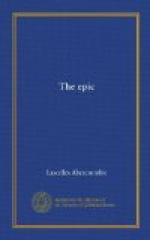But even more important, in the whole process of epic, than what Virgil’s art does, is the way it does it. And this in spite of the fact which everyone has noticed, that Virgil does not compare with Homer as a poet of seafaring and warfaring. He is not, indeed, very interested in either; and it is unfortunate that, in managing the story of Aeneas (in itself an excellent medium for his symbolic purpose) he felt himself compelled to try for some likeness to the Odyssey and the Iliad—to do by art married to study what the poet of the Odyssey and the Iliad had done by art married to intuitive experience. But his failure in this does not matter much in comparison with his technical success otherwise. Virgil showed how poetry may be made deliberately adequate to the epic purpose. That does not mean that Virgil is more artistic than Homer. Homer’s redundance, wholesale repetition of lines, and stock epithets cannot be altogether dismissed as “faults”; they are characteristics of a wonderfully accomplished and efficient technique. But epic poetry cannot be written as Homer composed it; whereas it must be written something as Virgil wrote it; yes, if epic poetry is to be written, Virgil must show how that is to be done. The superb Virgilian economy is the thing for an epic poet now; the concision, the scrupulousness, the loading of every word with something appreciable of the whole significance. After the Aeneid, the epic style must be of this fashion:
Ibant ovscuri sola sub nocte per umbram
Perque domos Ditis vacuas et inania regna:
Quale per incertam lunam sub luce maligna
Est iter in silvis, ubi caelum condidit
umbra
Jupiter, et rebus nox abstulit atra colorem.[11]
Lucan is much more of a Roman than Virgil; and the Pharsalia, so far as it is not an historical epic, is a political one; the idea of political liberty is at the bottom of it. That is not an unworthy theme; and Lucan evidently felt the necessity for development in epic. But he made the mistake, characteristically Roman, of thinking history more real than legend; and, trying to lead epic in this direction, supernatural machinery would inevitably go too. That, perhaps, was fortunate, for it enabled Lucan safely to introduce one of his great and memorable lines:
Jupiter est quodcunque vides, quodcunque moveris;[12]
which would certainly explode any supernatural machinery that could be invented. The Pharsalia could not be anything more than an interesting but unsuccessful attempt; it was not on these lines that epic poetry was to develop. Lucan died at an age when most poets have done nothing very remarkable; that he already had achieved a poem like the Pharsalia, would make us think he might have gone to incredible heights, were it not that the mistake of the Pharsalia seems to belong incurably to his temperament.




